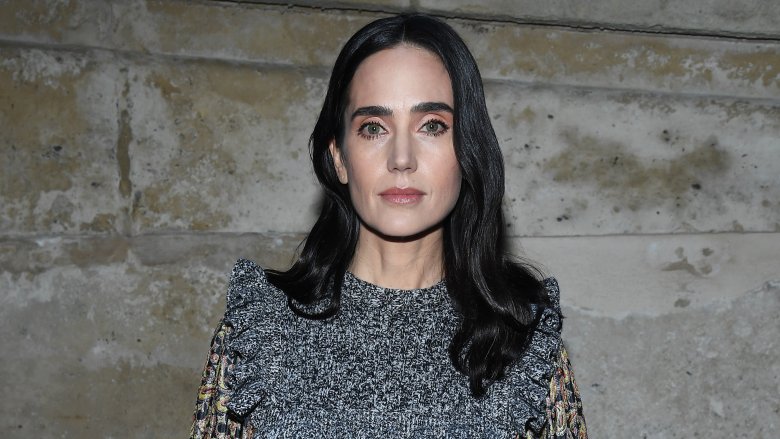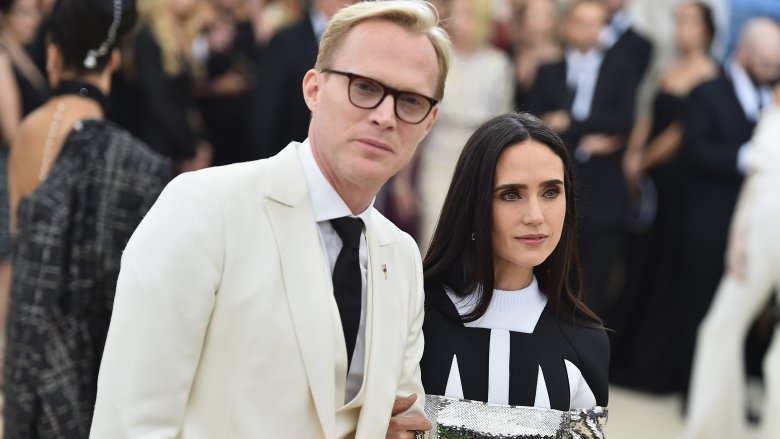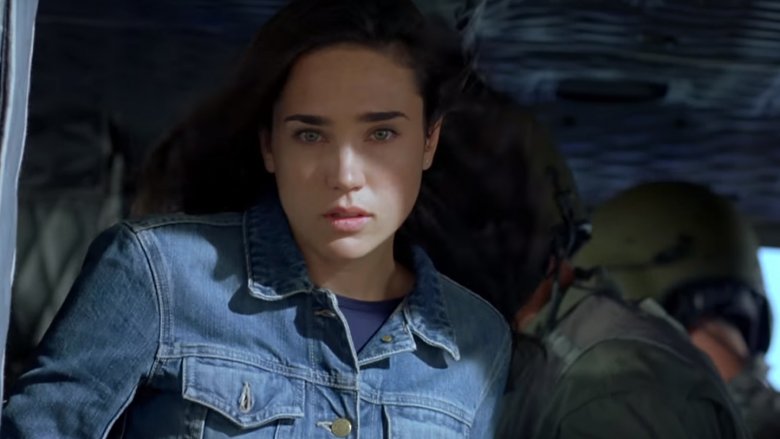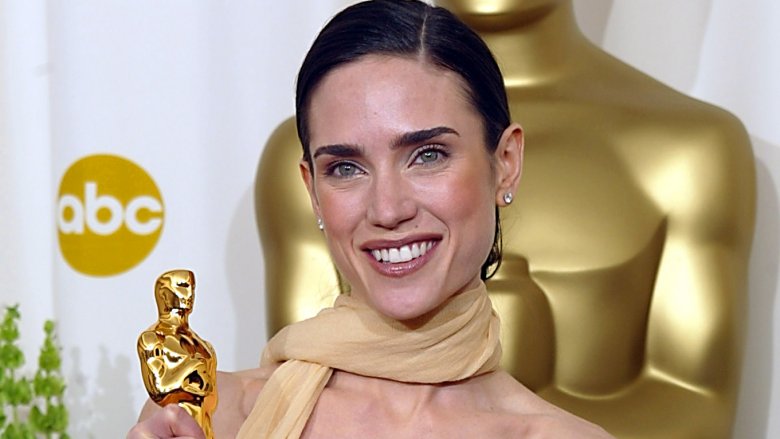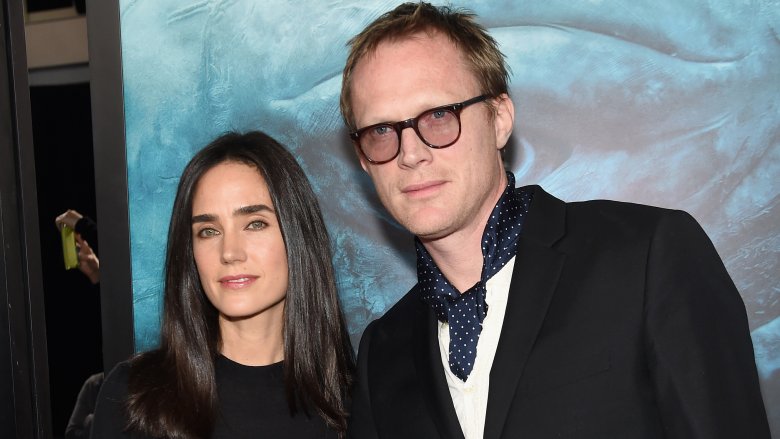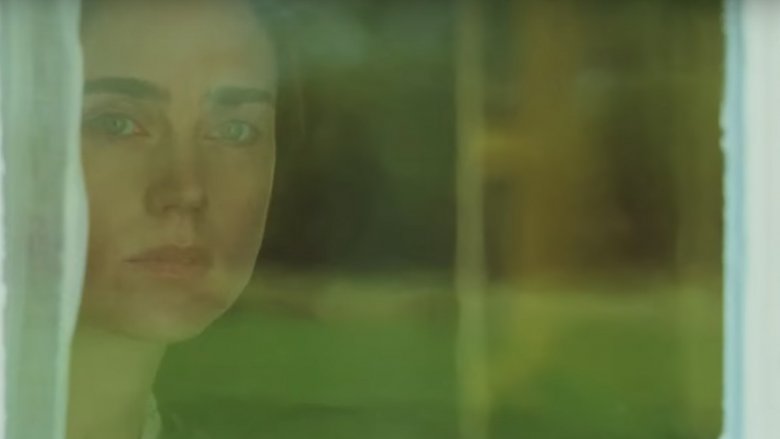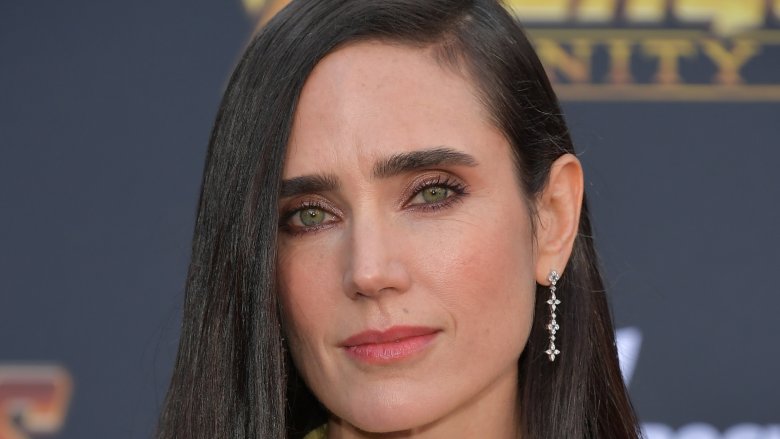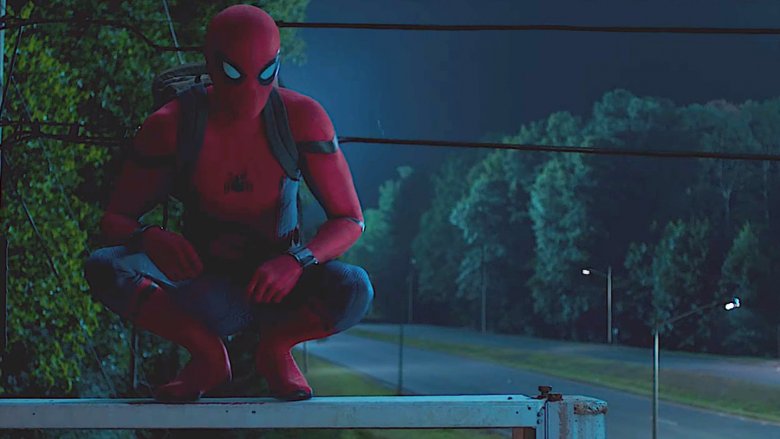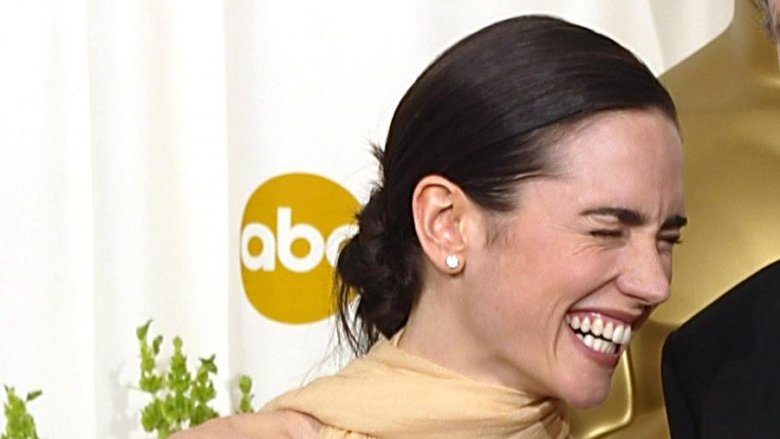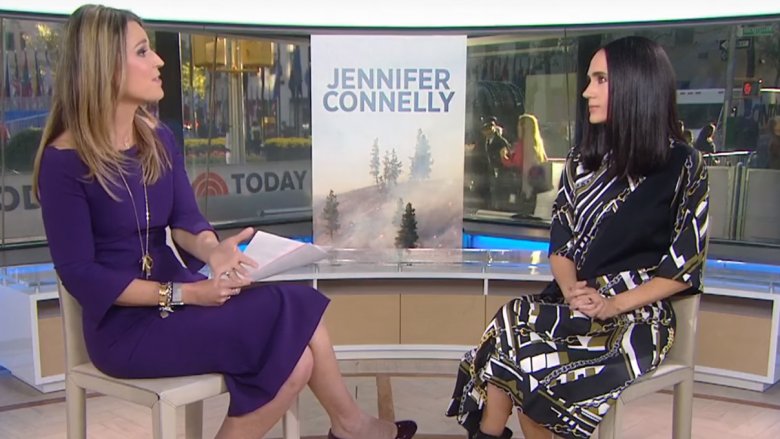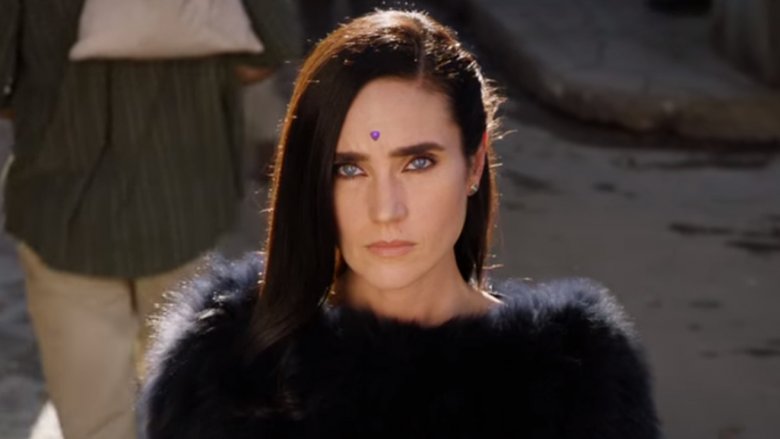Reasons You Don't Hear From Jennifer Connelly Anymore
Whether playing an ingenue in The Hot Spot, a humiliated drug addict in Requiem for a Dream, the wife of a schizophrenic mathematician in A Beautiful Mind (for which she won an Academy Award), or any one of dozens of other roles in movies both big and small, Jennifer Connelly is a captivating presence on the screen. She's the best thing about bad movies, gives the best performance in great movies, and holds herself to a standard most actors cannot attain. At the same time, she is intent on raising her children and being present for her husband, a fellow actor, adjusting priorities and her schedule in a manner that tends to keep stars out of the spotlight.
This has indeed happened to Connelly. In recent years, she has taken on roles in smaller films — independent, low-budget films that might take weeks to shoot instead of months — and spread out the time between them. She has taken on causes that are important to her and spoken about them in front of the camera. She works deliberately, but not always on things that bring the most exposure. This might be about to change, but before it does, let's take a look at why Jennifer Connelly has spent so much time of late in the shadows.
She focused on family
Family is very important to Jennifer Connelly; she and husband Paul Bettany (best known as The Vision in Marvel's Avengers films) have three children and contend with all the usual ups and downs of family life, with the added twist of the schedules and dramas (real and fictional) of having two working actors in the family. She has in recent years been touched by the sadness of losing parents. Her father Gerard died of cancer in 2008; it was, she told Glamour, "the first real heartbreak I've experienced. ... I don't have to work to feel the sadness of his loss. But I do have to work to feel happy about [having had] the time I had with him."
Connelly's parents divorced in 2000, and her mother Ilene, who had been living in California for years, moved back to New York to be closer to Connelly and her family. Ilene, who was a massage therapist, died of a heart attack in 2013. In an interview with Town and Country in 2015, Connelly spoke of spending more time with her mother in recent years, after having not been in very close contact with her previously. She also spoke of grieving for her parents, and the emotional aftermath of their passing. "Given those different rhythms," she said, "that feeling you have when they're both gone surprised me — how you feel tethered even when you don't see them physically. It's very strange."
'The Hulk' doused the heat on her big Oscar win ...
Jennifer Connelly earned the crowning achievement for any actor in 2002, winning the Academy Award for Best Supporting Actress, for her role in 2001's A Beautiful Mind. Her next film, director Ang Lee's Hulk (his take on the Marvel Comics superhero) was a critical and commercial letdown, a film so disappointing, it was rebooted a mere five years after its release. Connelly takes responsibility for accepting her role in the film and for her performance in it, but in an interview with The Guardian, she indicated the criticism still stings. "I can't say that I feel entirely neutral about it," she said of the film's reception. "Who wouldn't want people to respond favorably to something that they make? I want that, too."
Such was Lee's reputation at the time (based on his work in films like 1995's Sense and Sensibility and 1999's Crouching Tiger, Hidden Dragon) that Connelly took the role to work with him, based solely on a concept he explained to her; there wasn't even a script when she signed on. In an interview with Sci-Fi Wire before shooting began on Hulk, she recalled, "He said, 'Well, it's really a Greek tragedy. It's actually a psychodrama.'" Still, the film slammed the brakes on any momentum Connelly might have had after her Oscar win.
... but she felt shallow about winning anyway
Being at the top of one's profession can be a positive and a not-so-positive thing, depending on one's perspective and one's ability to handle the added attention and/or responsibility that comes with that achievement. Although she won the Best Supporting Actress Oscar for A Beautiful Mind, the attention given her surprised her, at least initially. "I remember looking up and seeing the sign that said you only had 45 seconds to speak and just feeling shocked by the exposure," she told The Telegraph in 2003. "It made me feel quite shallow. You just don't know what to expect up there ..."
She prefers to take time off between each movie
One decision Jennifer Connelly made in the years following her Oscar win was to take more time off between projects. For most of the early 2000s, she had kept to a pace of about two films per year, but there were spikes in her output later, particularly in 2009, when she tallied three films (He's Just Not That into You, 9, and Creation) and 2014, when she appeared in four of them (Winter's Tale, Aloft, Noah, and Shelter). Her recent output has slowed down once again to a less frantic, more manageable level.
Connelly clearly prefers this and, as illustrated by the fact that she went almost a year between wrapping Creation in December 2008 and stepping back in front of the camera for Virginia (then titled What's Wrong with Virginia?) in the fall of 2009. Her husband Paul Bettany likewise took time away from his duties as an actor and director, and with Connelly reveled in the family time, free of professional obligations. "I got to spend the whole year with my kids and my husband," she told The Guardian. "And that's wonderful. My job really suits me." The time off didn't hurt her performance, either: though Virginia received mostly negative reviews, Connelly's performance was singled out as one of the few positive elements in the film.
Some of the projects she poured her heart into didn't go so well
Jennifer Connelly met her husband, Paul Bettany, on the set of A Beautiful Mind, and both relish the opportunity to work together when they can. Bettany had already been cast to play Charles Darwin in 2010's Creation when the film's producers approached Connelly about playing Darwin's wife Emma. "I did think that it was the sort of film that we could do together," she told The Guardian, adding "Why do I want to? Because he's a very good actor and I thought it would be a privilege to work with him."
So work with one another they did, but the resulting film earned negative reviews from many critics (one sample, from the Minneapolis Star-Tribune: "Bettany's sheepish performance fails to engage, and Connelly, his wife in real life, seems distant and frigid. There is no sense of romance between them."). Some did like it, though, such as the esteemed critic Roger Ebert (the film showed "how sad and weakened Charles is [without] ratcheting up his grief into unseemly melodrama"), but it earned only $341,000 in domestic box office.
Five years later, Connelly starred in Shelter, which Bettany wrote and directed, but it fared even worse at the box office and with critics; AV Club noted, "In his earnest effort to depict how tough life is for the downtrodden, [Bettany] dogpiles his two protagonists with manufactured misery." She and Bettany have not worked together since.
She misses out on digital exposure
Jennifer Connelly admits to being desperately behind the times when it comes to technology. "In college I wrote on an old typewriter," she told Town and Country in 2015, the year she purchased her first computer (a Macbook Air, in case you're interested). And she only bought that so she could back up the content on her iPhone, which she had broken.
While Connelly's lack of technical savvy is amusing, it can also be damaging to her career. Social media exposure is so important in this day and age, particularly for actors involved in smaller projects who could use a boost in profile to share their work. From a content perspective, she could be one of the greats in social media, were she so inclined. She's a respected actor with opinions on gender issues in her field; she's married to a man who is heavily involved in the biggest films of our age (Marvel's Avengers and Iron Man series) and who had a role in a recent Star Wars film (Solo: A Star Wars Story); she's a mom who has raised three children in a family in which creativity is obviously an important concern; she's worked with interesting actors in both popular and small films. She could conceivably have a lot of advice to impart and great stories to tell (not to mention waiting fans to read them) were she to embrace the social tools available to her.
You probably missed her return to Marvel movies
Who could blame Jennifer Connelly if she stayed away from Marvel movies? Her previous starring role in one was Hulk, which was not a box office hit, nor was it positively reviewed by many critics. Granted, her husband Paul Bettany has had a different experience in his Marvel work, but few would think less of Jennifer Connelly if she left the superhero flicks to other actors.
She hasn't, of course; she's jumped back into the Marvel universe, only she's done it in a way that has attracted minimal attention, whether accidentally or otherwise. Connelly provided the voice of "Karen," the artificial intelligence (AI) inside Spider-Man's suit in Spider-Man: Homecoming. It's interesting to note that Tony Stark (a.k.a. Iron Man, played by Robert Downey Jr.), programmed the AI with a voice, as he did with his own suits. Through Iron Man 3 and the first Avengers film, the voice of Iron Man's AI was JARVIS, voiced by Bettany; that role has done wonders for his cultural recognition. But there has been no indication that Connelly will reprise her voice role in the forthcoming Spider-Man sequel, which carries the possibility of a similar boost for her.
She thinks her looks prohibit her from doing comedies
We might hear from Jennifer Connelly more if she broadened her sights and accepted roles that are not typically in her proverbial wheelhouse. Take comedies, for example. Early in Connelly's career — before she shined in heavy dramas like Requiem for a Dream or A Beautiful Mind — she starred in films like 1985's Seven Minutes in Heaven, 1988's Some Girls, and 1991's Career Opportunities. These were comedies: not particularly deep films, not particularly well-reviewed films, but light entertainment. However, Connelly's filmography for the last 25 or more years has been light on light entertainment.
Connelly doesn't think she would get comedic roles, in part because she doesn't think her appearance would fit the bill. She once told CBS Sunday Morning, "I think it's my eyebrows. I look stern even when I'm not stern. If I'm not feeling cross, I look a little bit cross. I can't help it. It's just my face." That comment itself might be a very good acting job, because she's Jennifer Connelly: she has extraordinary range and chooses roles that best suit her interests. One day, one of those roles could be a comedy, a sentiment she all but confirmed in an interview with Femail: "At this point I might have a bit of trouble trying to get myself cast in a comedy, but I'd love to do one. I haven't really done one as a grown-up person."
She's been focusing on larger issues
The accusations and charges of sexual harassment, assault, and/or rape against film producer Harvey Weinstein touched off a national conversation on gender equality and workplace abuse, which in turn brought about the #MeToo movement. As the scandal evolved and the conversation spread, media pundits began to discuss the issue as not simply a Hollywood problem, but an American problem. As a woman who has been in the entertainment industry since she was ten years old, Jennifer Connelly has been asked on several occasions for her thoughts on gender issues and the so-called "Weinstein effect," and she has been very forthcoming in her answers. "No woman should have to suffer those kinds of violations to get or maintain a job," she told Savannah Guthrie on the Today show. "In fact, no person should, anywhere, in our business or any business. It's a violation of human rights. I think the conversation is a really good starting point, [as is] supporting one another."
The conversation, however, is only the beginning, and the issue of sexual harassment is but one symptom of a much greater problem, one of gender parity, whether it be in Hollywood or on Main St. "You can see [lack of parity] in the statistics of violence against women, inequality of pay between men and women," Connelly told IndieWire. "We've come a long way ... but by and large, it feels that we still haven't achieved total equality in our culture."
She's going to be more visible, very soon
Jennifer Connelly has starring roles in two very big projects — one coming to television, and the other to the multiplex. In the TNT television series Snowpiercer (an extension of the Korean film of the same name, which starred Captain America himself, Chris Evans), she plays a survivor of a worldwide apocalypse who, with the rest of humanity, lives on a perpetually moving train that circumnavigates the planet. Her character is the "voice" of the train, a first-class passenger making public address announcements to all the train's inhabitants. The series has been greenlit for a full season of production, which means Connelly will be a weekly fixture on TV screens.
Connelly also plays a villain in the $200 million sci-fi film Alita: Battle Angel, based on the popular series of manga novels. James Cameron (Titanic, Avatar) is co-producing and co-wrote the film's screenplay with its director, Robert Rodriguez (Sin City, Machete, Spy Kids). The film's budget, producer/director combination, and startling CGI effects make it a movie that will attract a lot of attention and as one of its stars, Connelly will reap the benefits of that exposure.
